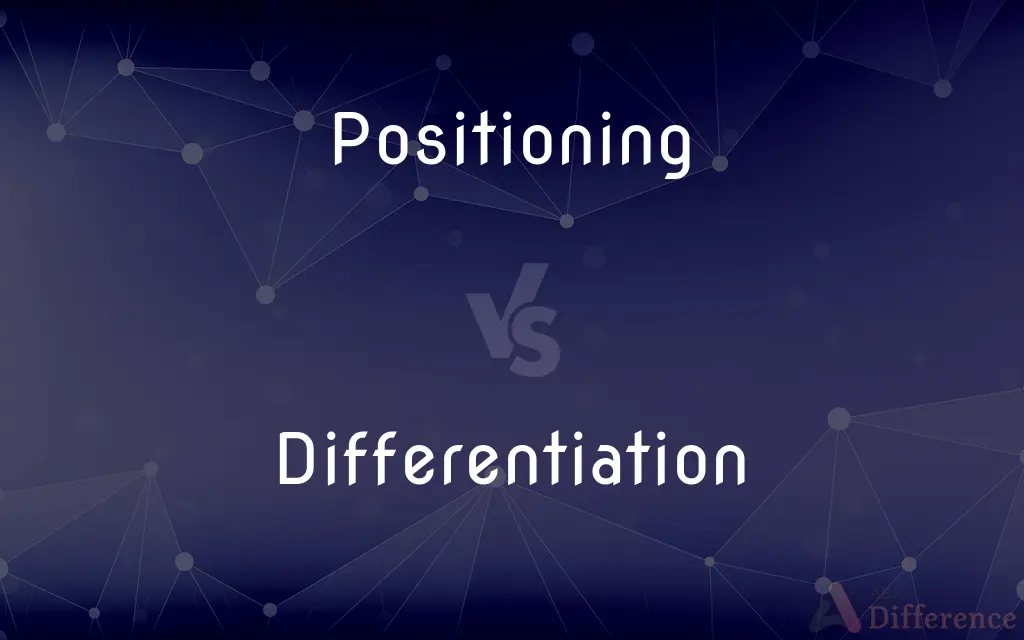Positioning vs. Differentiation — What's the Difference?
By Tayyaba Rehman & Urooj Arif — Updated on May 2, 2024
Positioning involves placing a product uniquely in the minds of consumers, focusing on perception, while differentiation emphasizes making a product distinct through unique features.

Difference Between Positioning and Differentiation
Table of Contents
ADVERTISEMENT
Key Differences
Positioning is about crafting a product's image and identity within a specific market segment, aiming to make it appealing to a targeted audience. Differentiation, on the other hand, deals with distinguishing a product by infusing unique attributes, benefits, or innovations not readily offered by competitors.
In positioning, the key strategy is to associate the product with certain values or qualities in the consumer's mind, such as luxury, affordability, or durability. Whereas differentiation might focus on tangible differences such as advanced technology, superior ingredients, or patented systems that physically set the product apart from others.
Effective positioning can influence a consumer’s perception without altering the physical product, relying heavily on advertising, branding, and promotional tactics. Differentiation often requires actual changes or developments in the product to ensure it offers something exclusive that can be clearly articulated and demonstrated.
Positioning strategies are particularly crucial in markets where products are similar and choices are made based on brand perception and identity. On the other hand, differentiation can be more crucial in markets where functional features and performance metrics are key decision-making factors for consumers.
Both positioning and differentiation are essential for a successful marketing strategy, but they serve different purposes. Positioning adjusts the consumer's perception, while differentiation adjusts the product itself.
ADVERTISEMENT
Comparison Chart
Focus
Consumer perception and market placement
Unique product features and capabilities
Strategy Foundation
Marketing, branding, and communication
Product development and innovation
Consumer Influence
Psychological appeal
Practical and functional benefits
Competitive Advantage
Achieved through perception differentiation
Achieved through product superiority
Key Techniques
Target market identification, tailored communications, brand personality
Innovative features, quality enhancements, exclusive offers
Compare with Definitions
Positioning
The act of designing the company’s offering and image to occupy a distinct place in the mind of the target market.
Effective positioning made the smartphone brand synonymous with high-end photography.
Differentiation
A strategy to develop features that make a product unique across its industry.
Their software’s user-friendly interface is a key differentiation from other data analysis tools.
Positioning
The process of differentiating a brand or product from its competitors by association with unique traits.
The luxury car brand’s positioning emphasizes superior craftsmanship and exclusivity.
Differentiation
The process of making a product or service stand out from competitors in ways that provide superior value.
Differentiation through innovative design has made their furniture highly sought after.
Positioning
The strategy of establishing a brand or product in a particular sector of market for specific consumer base.
The company's positioning in the eco-friendly market attracts environmentally conscious consumers.
Differentiation
Enhancing a product to give it unique attributes that satisfy different customer needs.
Differentiation by adding a solar battery feature has made their camping gear a market leader.
Positioning
A marketing technique that aims to present a product in the best possible light to different target audiences.
Their positioning strategy includes tailoring messages for both younger and older generations.
Differentiation
The development of distinct characteristics to create a competitive advantage.
Differentiation in customer service, with 24/7 support, sets the company apart from its competitors.
Positioning
Aligning a product with specific consumer expectations to increase its market appeal.
Positioning the new drink as a sports enhancer has significantly increased its popularity among athletes.
Differentiation
The pursuit of unique selling propositions that attract a particular segment of consumers.
Their differentiation strategy focuses on organic, chemical-free ingredients which appeal to health-conscious buyers.
Positioning
A place or location.
Differentiation
The act or process of differentiating.
Positioning
The right or appropriate place
The bands are in position for the parade's start.
Differentiation
The state of becoming differentiated.
Positioning
A strategic area occupied by members of a force
The troops took up positions along the river.
Differentiation
(Mathematics) The process of computing a derivative.
Positioning
The way in which something is placed
The position of the clock's hands.
Differentiation
(Biology) The process by which cells or tissues undergo a change toward a more specialized form or function, especially during embryonic development.
Positioning
The arrangement of body parts; posture
A standing position.
Differentiation
The act or process of differentiating (generally, without a specialized sense).
Positioning
In ballet, any of the five arrangements of the arms and feet in which the legs are turned out from the pelvis.
Differentiation
The act of treating one thing as distinct from another, or of creating such a distinction; of separating a class of things into categories; of describing a thing by illustrating how it is different from something else.
Positioning
An advantageous place or location
Jockeys maneuvering for position.
Differentiation
The process of developing distinct components.
Positioning
A situation as it relates to the surrounding circumstances
In a position to bargain.
Differentiation
(geology) The process of separation of cooling magma into various rock types.
Positioning
A point of view or attitude on a certain question
The mayor's position on taxes.
Differentiation
The process of applying the derivative operator to a function; of calculating a function's derivative.
Positioning
Social standing or status; rank.
Differentiation
The act of differentiating.
Further investigation of the Sanskrit may lead to differentiation of the meaning of such of these roots as are real roots.
Positioning
A post of employment; a job.
Differentiation
The act of distinguishing or describing a thing, by giving its different, or specific difference; exact definition or determination.
Positioning
(Sports) The area for which a particular player is responsible.
Differentiation
The gradual formation or production of organs or parts by a process of evolution or development, as when the seed develops the root and the stem, the initial stem develops the leaf, branches, and flower buds; or in animal life, when the germ evolves the digestive and other organs and members, or when the animals as they advance in organization acquire special organs for specific purposes.
Positioning
The arrangement of the pieces or cards at any particular time in a game such as chess, checkers, or bridge.
Differentiation
The supposed act or tendency in being of every kind, whether organic or inorganic, to assume or produce a more complex structure or functions.
Positioning
The act or process of positing.
Differentiation
A discrimination between things as different and distinct;
It is necessary to make a distinction between love and infatuation
Positioning
A principle or proposition posited.
Differentiation
The mathematical process of obtaining the derivative of a function
Positioning
A commitment to buy or sell a given amount of securities or commodities.
Differentiation
(biology) the structural adaptation of some body part for a particular function;
Cell differentiation in the developing embryo
Positioning
The amount of securities or commodities held by a person, firm, or institution.
Positioning
The ownership status of a person's or institution's investments.
Positioning
To put in place or position.
Positioning
To determine the position of; locate.
Positioning
Present participle of position
Positioning
The act of positioning; placement.
Positioning
The act of putting something in a certain place or location
Positioning
Causing to fall into line or into position
Common Curiosities
Can a product be positioned and differentiated at the same time?
Yes, a product can be both positioned and differentiated simultaneously to enhance its appeal and uniqueness in the market.
What is positioning in marketing?
Positioning is the process of establishing a product or brand in a specific market segment to create a desired perception in the consumers' minds.
How can a company implement a differentiation strategy?
A company can implement a differentiation strategy by innovating new product features, enhancing service quality, implementing advanced technology, and focusing on exceptional customer service.
Why is positioning important in marketing?
Positioning is crucial because it helps consumers easily identify what a product stands for, how it is different from competitors, and why they should prefer it over others.
How does positioning affect consumer behavior?
Positioning influences consumer behavior by shaping their perceptions and expectations about a brand or product.
Can differentiation lead to increased market share?
Yes, effective differentiation can lead to increased market share by attracting more customers who perceive the differentiated product as better suited to their needs than competing offerings.
Is differentiation always beneficial?
Differentiation is generally beneficial, but it must be meaningful to the target audience and sustainable over time to prevent competitors from easily replicating the unique features.
How does differentiation affect pricing strategy?
Differentiation often allows a company to charge premium prices because the unique features and perceived value justify the higher cost to consumers.
How does consumer perception influence positioning strategies?
Consumer perception heavily influences positioning strategies because businesses must align their positioning to meet the expectations and desires of their target market.
What is the difference between positioning and branding?
Positioning involves the strategic placement of a product in the market to achieve a certain image, while branding is about building a consistent identity that resonates with customers across all touchpoints.
What are the risks of poor product positioning?
Poor product positioning can lead to consumer confusion, brand dilution, and ineffective marketing strategies, which may ultimately impact sales negatively.
What does differentiation mean in business?
Differentiation refers to the development of unique product features and attributes that set a product apart from its competitors.
What are some examples of positioning in the marketplace?
Examples of positioning include a luxury car brand marketing itself as a symbol of status and prestige or a fast-food chain positioning itself as the best in speed and convenience.
How do companies measure the effectiveness of their positioning and differentiation strategies?
Companies measure the effectiveness of positioning and differentiation strategies through market research, consumer feedback, sales data, and market share analysis.
What impact does technology have on differentiation?
Technology can greatly enhance differentiation by enabling new product features, improving service delivery, and creating more efficient customer interactions.
Share Your Discovery

Previous Comparison
Surely vs. Surly
Next Comparison
Grandpa vs. GrandadAuthor Spotlight
Written by
Tayyaba RehmanTayyaba Rehman is a distinguished writer, currently serving as a primary contributor to askdifference.com. As a researcher in semantics and etymology, Tayyaba's passion for the complexity of languages and their distinctions has found a perfect home on the platform. Tayyaba delves into the intricacies of language, distinguishing between commonly confused words and phrases, thereby providing clarity for readers worldwide.
Co-written by
Urooj ArifUrooj is a skilled content writer at Ask Difference, known for her exceptional ability to simplify complex topics into engaging and informative content. With a passion for research and a flair for clear, concise writing, she consistently delivers articles that resonate with our diverse audience.
















































